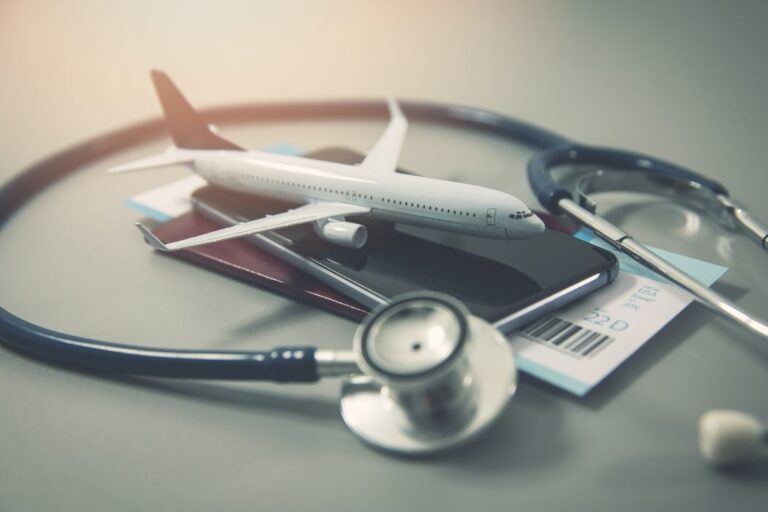
Do you travel for work, have a big holiday abroad planned, or are you relocating to another country?
In many cases, your destination country may require you to obtain a medical visa beforehand.
Each country has specific health checks needed to prove your medical fitness and obtain the relevant visa medical certificate. You should always be provided with these specifics as part of your visa application.
While this may seem frustrating, costly and time-consuming, these medical visas are for a perfect reason.
We’ll talk you through why you might be asked to get a medical visa and some of the specific countries’ requirements!
Why are medical visas necessary?
We understand that medical visas may be a pain to obtain, but they are vital for the well-being of your destination country. Essentially, it boils down to countries trying to protect themselves: they want to ensure that the people coming to live in, or visit, their country are healthy and do not bring diseases that could affect an otherwise healthy population.
For example, many countries want to see a chest X-ray to rule out Tuberculosis.
Each country has a specific list of health checks, from blood tests for sexually transmitted diseases to vaccinations, chest X-rays and ECGs to ensure your heart is working at full health.
What to expect at your medical appointment
Wherever you go, you’ll find the process may change slightly. However, in general, your healthcare provider or GP will follow this process:
- GP Consultation: A GP consultation is advised at the beginning, where you will have an appointment with your GP to discuss your health and your medical history. If needed, you may undergo additional physical examinations, blood tests and referral for investigations.
- Physical Assessments: The required physical examinations include general observations, such as height and weight, to more detailed assessments, such as blood tests and heart rate measurements.
- Follow-up Tests: You may be booked for follow-up tests, as required for your visa medical certificate.
- Your Visa Medical Certificate: Once all necessary assessments and tests are complete, your healthcare provider will fill out the necessary paperwork, and your visa medical certificate will be ready. The country in question will usually give you a form.
What are some of the requirements per country?
Each country differs, but let’s discuss a few main countries and their requirements.
Dubai
The tests currently required to obtain a medical visa for Dubai include blood tests for HIV, syphilis, Hepatitis B & C, & liver function, as well as a consultation on your past medical history & current health.
For women, a pregnancy blood test is also required.
Saudi Arabia
Saudi Arabia requires a full medical report, which includes a medical examination, urinalysis, blood test for HIV, syphilis, Hepatitis B & C, & liver function.
You will also be required to have a chest X-ray; an additional pregnancy test will be needed if you are female.
China
A medical visa for China requires the following tests:
- HIV
- Syphilis
- Hepatitis B
- Liver function
- Blood group
- Chest X-ray
- ECG
Seychelles
To meet the medical requirements for a work visa for Seychelles, you will need a medical examination, a chest X-ray, a stool test for salmonella typhi, and several blood tests to rule out HIV, Hepatitis B and syphilis, along with a full blood count.
Brunei
Brunei requires several tests, examinations and screenings. These include:
- Past & family medical history
- HIV
- Hepatitis B
- Malarial parasites
- Syphilis
- A urine test to rule out drug use
- A pregnancy blood test for women.
If you’re traveling for work and plan to be employed in the food industry, you must also have a stool test for parasites.
Brunei also requires vaccinations for Typhoid, Tetanus, & Hepatitis B and a chest X-ray.
Bahrain
Bahrain has a much more comprehensive list of medical tests required to get your medical visa, including:
- Comprehensive medical
- HIV test
- Hepatitis B test
- Hepatitis C test
- Syphilis test
- Urinalysis
- Stool test for ova, cysts, parasites
- Stool microanalysis
- Chest x-ray
How do you go about getting a test, and when?
So, you’ve read up about your destination country, you know you need a medical visa, and you’re prepared for the required tests; however, where do you get an approved medical assessment and when?
Firstly, it’s essential to make sure your GP or healthcare provider is approved to do these assessments. Most GPs and private doctors will be supported, but it’s always better to confirm this in advance.
Secondly, book your test as soon as possible, but ensure this is done within three months of your departure date. Most countries will specify how recent your assessment needs to be, so this should be easy to find out.
Whichever country you’re visiting, whether for work, holidays or personal reasons, ensure you approach the medical visa appointments positively and without stress. They are a formality purely to help protect that country’s population, so you have nothing to fear!



My experience with Visa Medicals at https://www.harleyhealthcentre.com/ was very positive. The process was easy to understand and the staff was very helpful in answering all my questions. The doctor was very knowledgeable and made sure I had all the information I needed. They provided a great service and I would highly recommend them to anyone needing to do a visa medical.